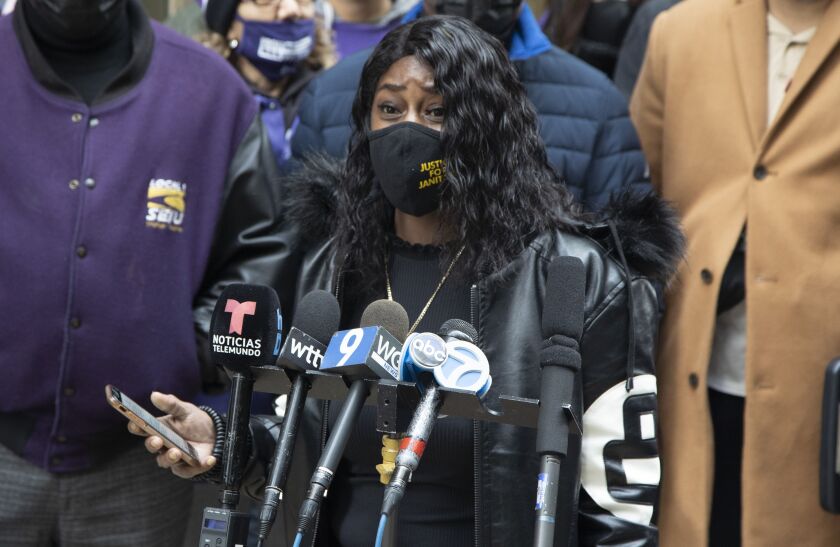One Chicago Public Schools custodian said she buys mops, brooms, garbage bags and disinfectant herself because her school isn’t stocked. And when she was out for two weeks, she came back to find her portion of the school hadn’t been cleaned.
Another said he gets paid about a month late.
One said her school gets 24 rolls of toilet paper each week to stock 25 bathrooms.
Despite years of complaints that the school district and the companies it hires to clean its buildings haven’t done an adequate job, union janitors say school working conditions are as bad as ever — even compared to a 2018 scandal that prompted protests and promises for change. Short staffing, a lack of cleaning supplies and general mismanagement by janitorial company Aramark are among the contributing problems, in their view.
“I am frustrated because here we are three years later, and it’s the same exact story,” said Maria Villegas, a custodian at Sayre Elementary in Galewood on the Northwest Side.
Villegas, who spoke through a Spanish interpreter, joined a few dozen custodians represented by SEIU Local 1, donning the union’s signature purple shirts and chanting “more staff, more supplies, we are here to organize,” as they protested Wednesday outside CPS’ Loop headquarters.
An 18-year veteran of CPS, Villegas said her school, which enrolls 430 students, has two custodians for three floors. Aramark’s contract calls for three janitors. She said she has had to pick and choose which bathrooms get toilet paper because not enough is supplied — and in many cases, she has dipped into her own wallet to fill the gaps. She doesn’t have enough cleaner to get rid of the urine smell on the bathroom floors.
No mops, towels or gloves
JuWanda Harris works at Bennett Elementary in Roseland on the Far South Side, where she said she hasn’t been given basics like mops, towels and gloves.
This fall Harris took two weeks off to care for her son who was sick, and when she came back it was clear a substitute custodian hadn’t been sent in her place. A teacher pulled her aside to let her know students had seen cockroaches and a mouse run across the classroom floor.
“I can’t believe our students and teachers are going through this in a pandemic,” Harris said, calling the conditions “unacceptable.”
Bennett has three custodians — one during the day and two in the evening — but would likely need five to be fully staffed, she said. One of the three works part-time, according to Aramark’s contract.
Donald McPherson, a custodian at King High School since 2009, said the equipment he uses to clean floors doesn’t work, leaving the custodians to mop the 310,545-square-foot building in Kenwood. Meanwhile, McPherson isn’t getting paid on time, he said: “It’s taking over a month to pay you.” The school is supposed to have 10 custodians, but McPherson said it’s short four.
“Over my 10 years, it has never been this bad,” he said. “We as custodians work hard for the kids in the schools to have a great place to learn.”
Attention has returned to dirty schools over the past few weeks after CPS introduced a new facility management system at the start of October that janitors said has caused more problems. At Harris’ school, Sodexo was in charge of cleaning until Oct. 1, when Aramark took over. Conditions have worsened in that time, she said.
Late last month, the Chicago Sun-Times documented conditions at a Southwest Side elementary school that were so bad teachers, staff, parents and even kids took it upon themselves to wield mops and vacuums to clean their learning environment. Students reported seeing roaches in their classrooms and bathrooms, floors were filthy and garbage piled up.
A few days after that report, CPS ousted its facilities chief, Clarence Carson, who was hired in 2018 as a direct response to filthy school conditions and tasked with correcting the problems.
That year, complaints and Sun-Times reporting documented the extent of the filth in the city’s public schools. Janitors protested then, and the district forced out its then-facilities chief.
“It’s like déjà vu,” said Genie Kastrup, executive vice president of SEIU Local 1. “Our CPS custodians have sounded the alarm bells time and time again. The difference now is we are in the midst of a deadly pandemic. Our schools are supposed to be safe havens for our kids.”
In a survey conducted by the union of 287 of its 1,542 CPS custodians, 55% said they haven’t been provided with adequate cleaning supplies, and 41% have used their own money to buy what they need. About 81% said short-staffing has increased their workload just as nearly all of them said it takes longer to clean because of COVID-19.
CPS spokesman Evan Moore said the district isn’t aware of any custodial supply problems, and that Aramark manages its workers and supplies. The district verifies inventory during building audits, he said. Moore didn’t respond to questions on whether the district has considered measures such as withholding payment to ensure Aramark meets its contract requirements.
Aramark representatives didn’t respond to requests for comment.
The district has largely blamed the problems on staffing shortages. In addition to the workers represented by SEIU 1, the district directly employs about 800 janitors for a total of 2,300 currently working in schools.
CPS has said it needs to hire an additional 300 custodians to adequately clean schools. Union leaders on Wednesday said they believed the district is short about 500.
Contributing: Lauren FitzPatrick








